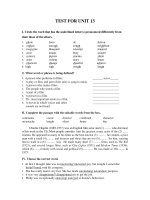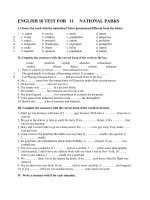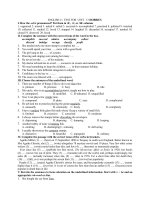- Trang chủ >>
- Đề thi >>
- Đề thi lớp 11
ENGLISH 11 TEST FOR UNIT 13 HOBBIES
Bạn đang xem bản rút gọn của tài liệu. Xem và tải ngay bản đầy đủ của tài liệu tại đây (193.35 KB, 7 trang )
ENGLISH 11 TEST FOR UNIT 13 HOBBIES
I. How the -ed is pronounced? Put them in /d/, /t/, or /Id/ columns
1. organized 2. missed 3. naked 4. called 5. occurred 6. accomplished 7. practised 8. polluted 9. watched
10. collected 11. studied 12. loved 13. stopped 14. laughed 15. discarded 16. occupied 17. marked 18.
closed 19. deserved 20. faxed
II. Complete the sentence with the correct form of the word in the box.
accomplish succeed admire accompany collect
discard indulge occupy classify profit
1. She needed only one more stamp to complete her ….
2. You could spend your time … more with a good book.
3. The girl sang to the …… of a piano.
4. Drawing and singing were among her many ….
5. He never lost the ……. of his students.
6. My doctor advised me to avoid … excessive in sweets and canned drinks.
7. We need something to keep the children……. in their summer holiday.
8. The books are into different categories to subject.
9. Confidence is the key to ……
10. The room was littered with …… newspapers.
III. Choose the antonym of the underlined word.
1. There are number of things I like to do in my free time.
A. pleisure B. precious C. busy D. idle
2. My uncle, who is an accomplished guitarist, taught me how to play.
A. unimpaired B. unskilled C. ill-educated D. unqualified
3. Now I can playa few simple tune.
A. compound B. plain C. easy D. complicated
4. He advised me to practise playing the guitar regularly.
A. unusually B. commonly C. freely D. completely
5. I have a modest little glass fish tank where I keep a variety of small fish.
A. limitted B. excessive C. conceited D. moderate
6. I always remove the stamps before discarding the envelopes.
A. dispensing B. disposing C. dumping D. keeping
7. Another hobby of mine is keeping fish.
A. omitting B. discharging C. releasing D. delivering
8. I usually throwaway the common stamps.
A. distinctive B. beautiful C. unpopular D. ordinary
IV. Complete the passage with the correct tense of the verbs in brackets.
Agatha Miller (1) (bear) on 15 September 1890 in Torquay in south-west England. Better known as
Mrs Agatha Christie, she (2) (write) altogether 78 mystery novels and 19 plays. Very few other crime
writers (3) (write) more books than this, and few (4) (become) so immensely popular.
Ever since she (5) (publish) her first novel, The Mysterious Affair at Styles in 1920, her books
(6) (never, be) out of print. They (7) (translate) all over the world, and, perhaps surprisingly, her
sales (8) (actually increase) since she, (9) (die) in 1976. For a short time after her death they
(10) (fall), so it was perhaps the screen that (11) (revive) her popularity.
People (12) (enjoy) Agatha Christie's stories for years, and her popularity currently (13) (seem)
higher than it (14) (ever be). It is not of course the first time that an author (15) (become) more
popular in death than in life.
V. Rewrite the sentences to focus attention on the underlined information. Start with it + be and an
appropriate wh-word or that.
1. She bought the car from Tom.
2. My secretary sent the bill to Mr Harding yesterday.
3. He already plays for national side; he only turned professional last year.
4. The film was made in Bristol.
5. We are coming to stay with Jane this weekend.
6. Columbus sailed to America in 1492.
7. The president makes the important decisions.
8. I'm not looking forward to physics, but I'm most worried about, the statistics exam.
9. She's been seeing a doctor at Newtown Hospital, but she's having the operation in the Queen Mary
Hospital.
10. Caroline has been feeling a bit depressed for some time, so she booked a holiday in Amsterdam to
cheer her up.
11. It's not that I don't want to have dinner with you tonight; I can't come because I've got so much work
to do.
12. I had my wallet when I went into the sports hall, so I lost it somewhere in there.
13. She doesn't find learning language very easy, and she improved her Spanish only by studying very
hard.
14. I have had great help from my best friend Dave in doing my research, and I delicate this thesis to him.
15. I don't mind her criticising me, but I object to how she does it.
V. Fill in each blank with an appropriate preposition.
1. My uncle is very good accompanying people singing his guitar.
2. My brother is fond tennis.
3. I have not been very successful playing the guitar.
4. He's keen collecting coins.
5. I usually give the common stamps to my friends.
6. She was free to indulge leisure activity like reading.
7. I don't need these papers - you can throw it
8. John is very interested all sorts of sport.
9. I classify my books different categories.
10. Books provide the reader so many facts and so much information.
VI. Rewrite the following as indicated, making any other changes necessary.
1. I don't like keeping fish. My sister doesn't like keeping fish either.
Neither
2. We need to make people realize that drug-taking is self-destructive.
What
3. I suppose the hope of easy money tempts them.
I suppose it
4. I have not experienced such a storm since I was a child.
Not
5. Those children were not very well educated.
Those children's
6. We expected that the report will be published shortly.
The report
7. It's all his' talk of poverty that really annoys me.
What
8. We only learnt the truth yesterday.
It
9. People sometimes suggest that we are not all equal. This makes some people very angry.
Any
10. If it hadn't been for your help he would be in a worse mess.
If you
VII. Give responses beginning 'No, what ', correcting what was said in the question. Use the notes
in brackets to help.
1. 'Did you say that Bernard was going to live in Australia?' (holiday/ Australia)
2. 'Do you hope to sell your Picasso paintings?' (be put into/ public art gallery)
3. 'Did it annoy you that Clare came, so late?' (not apologise)
4. 'Did you mean to give Erica your bike?' (could borrow it/ until needed again)
5. 'Did you watch the football on TV last night?' (get, brother/ video it/ watch tonight)
6. 'This steak tastes delicious. Did you fry it?' (put oil and soy sauce on/ grill)
7. 'Did you buy Sue the coat she wanted?' (give/ money towards it)
8. 'Did you fly from Sydney to Brisbane?' (hire a car/ drive all the way)
9. 'Did you stay with Keith for the New Year?' (invite him/ my ,house instead)
10. 'Did you think that I would take Mark to piano practice?' (going/ his own)
ENGLISH 11 TEST FOR UNIT 13 HOBBIES
I. How the -ed is pronounced?
1. organized /d/ 11. studied /d/
2. missed /t/ 12. loved /d/
3. naked /id/ 13. stopped /t/
4. called /d/ 14. laughed /t/
5. occurred /d/ 15. discarded /id/
6. accomplished /t/ 16. occupied /d/
7. practised /d/ 17. marked /t/
8. polluted /id/ 18. closed /t/
9. watched /t/ 19. deserved /d/
10. collected /id/ 20. faxed /t/
II. Complete the sentence with the correct form of the word in the box.
accomplish succeed admire accompany collect
discard indulge occupy classify profit
11. She needed only one more stamp to complete her collection.
12. You could spend your time more profitably with a good book.
13. The girl sang to the accompaniment of a piano.
14. Drawing and singing were among her many accomplishments.
15. He never lost the admiration of his students.
16. My doctor advised me to avoid excessive indulgence in sweets and canned drinks.
17. We need something to keep the children occupied in their summer holiday.
18. The books are classified into different categories to subject.
19. Confidence is the key to success.
20. The room was littered with discarded newspapers.
III. Choose the antonym of the underlined word.
9. There are number of things I like to do in my free time.
a. pleisure b. precious c. busy d. idle
10. My uncle, who is an accomplished guitarist, taught me how to play.
a. unimpaired b. unskilled c. ill-educated d. unqualified
11. Now I can playa few simple tune.
a. compound b. plain c. easy d. complicated
12. He advised me to practise playing the guitar regularly.
a. unusually b. commonly c. freely d. completely
13. I have a modest little glass fish tank where I keep a variety of small fish.
a. limitted b. excessive c. conceited d. moderate
14. I always remove the stamps before discarding the envelopes.
a. dispensing b. disposing c. dumping d. keeping
15. Another hobby of mine is keeping fish.
a. omitting b. discharging c. releasing d. delivering
16. I usually throwaway the common stamps.
a. distinctive b. beautiful c. unpopular d. ordinary
IV. Complete the passage with the correct tense of the verbs in brackets.
Agatha Miller (1) was born (bear) on 15 September 1890 in Torquay in south-west England. Better
known as Mrs Agatha Christie, she (2) wrote (write) altogether 78 mystery novels and 19 plays. Very few
other crime writers (3) have written (write) more books than this, and few (4) have become (become) so
immensely popular.
Ever since she (5) published (publish) her first novel, The Mysterious Affair at Styles in 1920, her
books (6) have never been (never, be) out of print. They (7) have been translated (translate) all over the
world, and, perhaps surprisingly, her sales (8) have actually increased (actually increase) since she, (9)
died (die) in 1976. For a short time after her death they (10) fell (fall), so it was perhaps the screen that
(11) revived (revive) her popularity.
People (12) have enjoyed (enjoy) Agatha Christie's stories for years, and her popularity currently
(13) seems (seem) higher than it (14) has ever been (ever be). It is not of course the first time that an
author (15) has become (become) more popular in death than in life.
V. Rewrite the sentences to focus attention on the underlined information. Start with it + be
and an appropriate wh-word or that.
16. She bought the car from Tom.
It was Tom who/ that she bought the car from.
17. My secretary sent the bill to Mr Harding yesterday.
It was my secretary who/ that sent the bill to Mr Harding yesterday.
18. He already plays for national side; he only turned professional last year.
He already plays for the national side, it was only last year when/that he turned professional.
19. The film was made in Bristol.
It was in Bristol where/ that the film was made.
20. We are coming to stay with Jane this weekend.
It is Jane who/ that we are coming to stay with this weekend.
21. Columbus sailed to America in 1492.
It was in 1492 when/ that Columbus sailed to America.
22. The president makes the important decisions.
It is the president who/ that makes the important decisions.
23. I'm not looking forward to physics, but I'm most worried about, the statistics exam.
I'm not looking forward to physics, but it is the statistics exam which/that I'm most worried about.
24. She's been seeing a doctor at Newtown Hospital, but she's having the operation in the Queen Mary
Hospital.
She's been seeing a doctor at Newtown Hospital, but it's in the Queen Mary Hospital where/ that
she's having the operation.
25. Caroline has been feeling a bit depressed for some time, so r booked a holiday in Amsterdam to
cheer her up.
Caroline has been feeling a bit depressed for some time, so it was to cheer her up that I booked a
holiday in Amsterdam.
26. It's not that I don't want to have dinner with you tonight; I can't come because I've got so much work
to do.
It's not that I don't want to have dinner with you tonight; it's because I've got so much work to do that I
can't come.
27. I had my wallet when I went into the sports hall, so r lost it somewhere in there.
I had my wallet when I went into the sports hall, so it was somewhere in there which/that I lost it.
28. She doesn't find learning language very easy, and she improved her Spanish only by studying very
hard.
She doesn't find learning language very easy, and it's only by studying very hard that she improved
her Spanish.
29. I have had great help from my best friend Dave in doing my research, and I delicate this thesis to him.
I have had great help from my best friend Dave in doing my research, and it's to him that I delicate
this thesis.
30. I don't mind her criticising me, but I object to how she does it.
I don't mind her criticizing me, but it's how she does it that I object to.
VI. Give responses beginning 'No, what ', correcting what was said in the question. Use the
notes in brackets to help.
11. 'Did you say that Bernard was going to live in Australia?' (holiday/ Australia)
No, what I said was that he was going on holiday to Australia.
12. 'Do you hope to sell your Picasso paintings?' (be put into/ public art gallery)
No, what I hope is that they will be put into a public art gallery.
13. 'Did it annoy you that Clare came, so late?' (not apologise)
No, what annoyed me was that she didn't apologise.
14. 'Did you mean to give Erica your bike?' (could borrow it/ until needed again)
No, what I meant was that she could borrow it until I needed it again.
15. 'Did you watch the football on TV last night?' (get, brother/ video it/ watch tonight)
No, what I did was (to) get my brother to video it and I'll watch it tonight.
16. 'This steak tastes delicious. Did you fry it?' (put oil and soy sauce on/ grill)
No, what I did was (to) put some oil and soy sauce on it and grill it.
17. 'Did you buy Sue the coat she wanted?' (give/ money towards it)
No, what I did was (to) give her some money towards it.
18. 'Did you fly from Sydney to Brisbane?' (hire a car/ drive all the way)
No, what I did was (to) hire a car and drive all the way.
19. 'Did you stay with Keith for the New Year?' (invite him/ my ,house instead)
No, what I did was (to) invite him to my house instead.
20. 'Did you think that I would take Mark to piano practice?' (going/ his own)
No, what I thought was that he was going/ would be going on his own.
VII. Fill in each blank with an appropriate preposition.
11. My uncle is very good at accompanying people singing with his guitar.
12. My brother is fond of tennis.
13. I have not been very successful in/ at playing the guitar.
14. He's keen on collecting coins.
15. I usually give away the common stamps to my friends.
16. She was free to indulge in leisure activity like reading.
17. I don't need these papers - you can throw it away.
18. John is very interested in all sorts of sport.
19. I classify my books into different categories.
20. Books provide the reader with so many facts and so much information.
VIII. Rewrite the following as indicated, making any other changes necessary.
11. I don't like keeping fish. My sister doesn't like keeping fish either.
Neither my sister nor I like keeping fish.
12. We need to make people realize that drug-taking is self-destructive.
What we need to make people realize is that drug taking is self-destructive.
13. I suppose the hope of easy money tempts them.
I suppose it 's the hope of easy money that tempts them.
14. I have not experienced such a storm since I was a child.
Not since I was a child have I experienced such a storm. .
15. Those children were not very well educated.
Those children's education was not very good.
16. We expected that the report will be published shortly.
The report is expected to be published shortly.
17. It's all his' talk of poverty that really annoys me.
What really annoys me is all his talk of poverty.
18. We only learnt the truth yesterday.
It was only yesterday that we learnt the truth.
19. People sometimes suggest that we are not all equal. This makes some people very angry.
Any suggestion that we are not all equal makes some people very angry.
20. If it hadn't been for your help he would be in a worse mess.
If you hadn't helped him, he would be in a worse mess.









